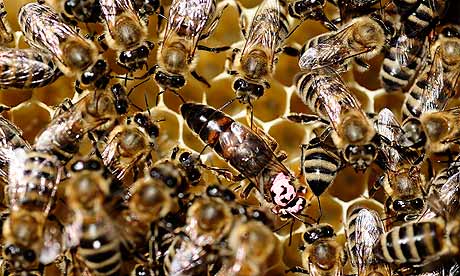
Dr Helen Thompson's study was frequently cited by ministers arguing against a ban on neonicotinoids. Photograph: Ognen Teofilovski/Reuters Ognen Teofilovski/REUTERS
'Revolving door' Pesticides Bee deaths
Government bee scientist behind controversial study joins pesticide firm
MP raises fears that government agency and pesticides industry are 'too close' as Dr Helen Thompson moves to Syngenta

Dr Helen Thompson's study was frequently cited by ministers arguing against a
ban on neonicotinoids. Photograph: Ognen Teofilovski/Reuters Ognen Teofilovski/REUTERS
Friday 26 July 2013
http://www.theguardian.com/environment/2013/jul/26/government-bee-scientist-pesticide-firm
A key government scientist whose research was used by ministers to argue against a ban on pesticides thought to harm bees is to join Syngenta, the chemical giant which manufactures one of the insecticides.
Dr Helen Thompson will leave the government's Food and Environment Research Agency (Fera) to join Syngenta on 1 September. Thompson led a field trial of the effect of neonicotinoids – the world's most widely used insecticides – on bees, which was fast-tracked and frequently cited by ministers – although the UK subsequently failed to block a two-year ban in Europe on the pesticides after 15 other EU nations voted in favour.
"Government policy should be informed by unbiased and disinterested scientific research," said Joan Walley MP, chair of the environmental audit committee, whose report in April accused the environment secretary Owen Paterson's department of "extraordinary complacency" over bees and pesticides. "This principle is undermined if the government research agency is too close to the pesticides industry and if scientists are zigzagging between the two."
A Fera spokeswoman said: "Dr Thompson's move is a reflection of her expertise and international reputation within the scientific community. There is no conflict of interest. There are very specific rules for civil servants governing the acceptance of appointments outside the civil service."
Thompson was immediately withdrawn from research projects which could lead to a conflict of interest when she informed Fera of her new job on 4 July. A Syngenta spokesman said that for one year Thompson would "have no direct professional contact" with Fera or the Department of Environment, Food and Rural Affairs (Defra), nor work on any UK or European Union projects. "Syngenta is committed to fully understanding and developing solutions to the problem of declining bee health," said the spokesman. "Experienced scientists are the key to achieving this goal." For the first year, Thompson will work on a "range of international projects", said Syngenta.
Bees and other pollinators are vital for the production of three-quarters of the world's food crops but have seen serious declines in recent decades. Loss of flowery habitats and rising disease have been blamed, as well as increasing use of pesticides.
Thompson led a field project intended to test the effect of neonicotinoids on bumblebees. However, the study wascriticised as flawed after the near ubiquitous use of the insecticides led to the contamination of colonies meant to be pesticide-free controls. Thompson also worked on a Fera project on bees and pesticides paid for by Syngenta, as well as having worked on the registration of some pesticides. In April, the Observer revealed intense behind-the-scenes lobbying by Syngenta, including threatening to sue individual officials at the European Food Safety Authority involved in publishing a report that found the pesticides posed an unacceptable risk to bees.
"Given the obvious scope for conflicts of interest, we need assurances that the civil service code on impartiality has been applied in this particular case," said Walley. "When my select committee scrutinised pesticides regulation, we highlighted the need for increased transparency in relation to testing and trials. This case demonstrates why that recommendation was so important. Defra will publish its response to our report soon, and I look forward to reading its proposals on enhanced transparency."
A Defra spokeswoman said: "Dr Thompson is a respected scientist and we have absolute confidence in the professionalism and independence of her work. All civil servants are bound by the Official Secrets Act on appointment and are not allowed to disclose confidential information to any future employer."
In June, ministers launched an "urgent" review of the crisis facing bees and other pollinators in the UK and pledged to introduce a national pollinator strategy.
Friends of the Earth's Paul de Zylva said: "This is yet another example of the revolving door that exists between government and big business. The public must have confidence that the government is doing all it can to safeguard Britain's threatened bees. The best way to do this by ensuring its national pollinator strategy tackles all the causes of bee decline – including pesticides."
Regarding the contract work performed for companies by Fera, the Fera spokeswoman said: "Fera's commercial activities are governed by HM Treasury guidance. In addition, all Fera employees are bound by the civil service code which covers standards while in post."